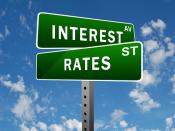Changes in interest rates can have both positive and negative effects on the Malaysian markets. When the Bank Negara changes the rate at which banks borrow money, this has a ripple effect across the entire economy. Interest rates can have an effect on the economy as a whole, the stock and bond markets, inflation and recessions.
1.How Interest can affect Malaysian consumer's spendingWith every loan, there is a possibility that the borrower will not repay the money. To compensate lenders for that risk, there must be a reward. Interest is the amount of money that lenders earn when they make a loan that the borrower repays, and the interest rate is the percentage of the loan amount that the lender charges to lend money.
The existence of interest allows borrowers to spend money immediately, instead of waiting to save the money to make a purchase. The lower the interest rate, the more willing people are to borrow money to make big purchases, such as houses or cars.
When consumers pay less in interest, this gives them more money to spend, which can create a ripple effect of increased spending throughout the Malaysian economy. Businesses also benefit from lower interest rates, as it encourages them to make large equipment purchases due to the low cost of borrowing. This creates a situation where output and productivity increase.
Higher interest rates mean that Malaysian consumers don't have as much disposable income and must cut back on spending. When higher interest rates are coupled with increased lending standards, banks make fewer loans. This affects not only consumers, but also businesses, who cut back on spending for new equipment, thus slowing productivity or reducing the number of employees. The tighter lending standards and criteria mean that consumers will cut back on spending, and...



Very good
This is a very good masters. Fully explained ideas. Nice work.
0 out of 0 people found this comment useful.